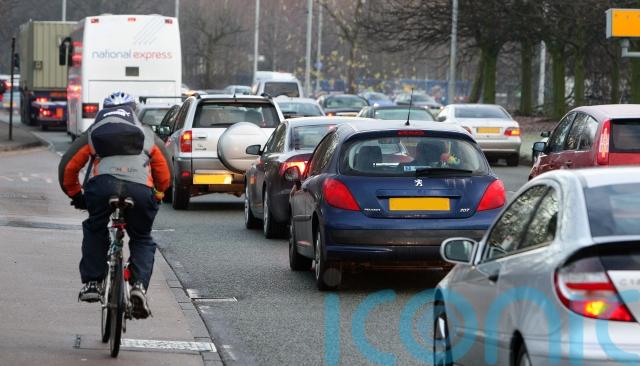
Drivers in Greater Manchester will not have to pay for a Clean Air Zone but the region will still achieve its air pollution targets under a new plan, Mayor Andy Burnham has said.
The authority is obliged to reduce nitrogen dioxide to acceptable levels by 2026.
It says it can do this a year earlier by investing £51.2 million in zero-emission electric buses for the Bee Network, with £30.5 million in grants for cleaner taxis and £5 million to manage traffic flows in the city centre.
🐝 We've set out a compelling plan to show how Greater Manchester can meet clean air targets with a non-charging approach, investing in:
🚍 Zero-emission electric buses on our @BeeNetwork🚕 A Clean Taxi Fund🚦 Better traffic management
Find out more 👇https://t.co/Cbn2yTkGFl
— Mayor of Greater Manchester Andy Burnham (@MayorofGM) December 13, 2023
These plans are to be submitted to central Government for approval.
Greater Manchester said its modelling showed that a Clean Air Zone which charged drivers would not meet the 2026 target.
Mr Burnham said: “By accelerating investment in the Bee Network to create a London-style integrated public transport network, and upgrading GM-licensed taxis, we can improve air quality faster than if we introduced a Clean Air Zone, and without causing hardship to our residents or businesses.”
Clean Air Zones are becoming increasingly popular tools for local authorities around the UK which are seeking to control air pollution in their cities.
The Manchester scheme was put on hold in February to be reviewed and was subsequently dropped a few months later, with Mr Burnham saying that if ministers wanted it they would have to impose it themselves.
It would have seen buses and lorries charged £60 a day to use the region’s roads.

Vans and minibuses would have been charged £10 a day and taxis registered in Greater Manchester £7.50 a day from the following year, and, at the same time, a charge of £60 for coaches would apply.
Bury Council leader Eamonn O’Brien said: “We know that there are very serious consequences of dirty air in Greater Manchester and that the health impacts are not always felt equally.
“We want to do the right thing in the right way, using an investment-led, non-charging plan to clean the air in a supportive and transitional way, that does not create the risk of financial hardship.
“While we can now prove our case for an investment-led plan, modelling shows that we can’t achieve compliance through a charging Clean Air Zone by 2026.
“There is now a compelling case for what Greater Manchester has set out – a plan that is fairer, cheaper, more affordable and more democratic.”
Manchester had previously rejected a congestion charge similar to the London scheme in a referendum 15 years ago.
Air pollution is a public health emergency, associated with to up to 1,200 attributable early deaths every year in Greater #Manchester. Government at all levels need to work together to take the steps needed to protect health across the region.
— Asthma + Lung UK (@asthmalunguk) December 13, 2023
Sophie Wilks, campaigns manager for clean air at Asthma + Lung UK, said the current plans still did not provide enough certainty to Greater Manchester residents.
She added: “Air pollution is a public health emergency, associated with up to 1,200 attributable early deaths every year in Greater Manchester alone.
“Toxic air can worsen and trigger respiratory symptoms including wheezing, breathlessness and coughing, and in more severe cases can lead to life-threatening asthma attacks.
“Greater Manchester has the highest rate of air pollution in the country. Government at all levels need to work together to take the steps needed to protect health across the region.”
Subscribe or register today to discover more from DonegalLive.ie
Buy the e-paper of the Donegal Democrat, Donegal People's Press, Donegal Post and Inish Times here for instant access to Donegal's premier news titles.
Keep up with the latest news from Donegal with our daily newsletter featuring the most important stories of the day delivered to your inbox every evening at 5pm.